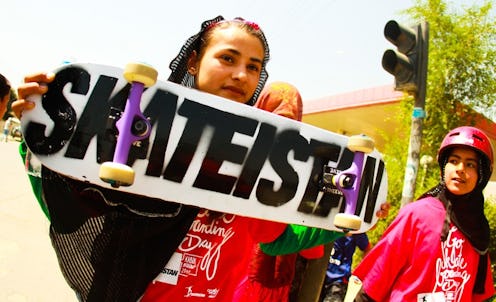
When Australian skateboarder Oliver Percovich arrived in Kabul, Afghanistan in 2007 with a board and four wheels, he had no idea what he was skating into. As he began to glide up and down a makeshift stone ramp, he noticed a crowd of curious children gathering. And not just any children — girls. They were fascinated.
Upon gauging the girls' reaction to his skateboarding, a sport that didn't really exist in the country until he brought it there, Percovich realized he may have found a way to use his passion for skateboarding to help others. He decided to found Skateistan, a nonprofit/NGO using skateboarding to empower, educate, and engage youth in Middle Eastern and African countries.
“It shocked me that girls didn’t ride bicycles because it was deemed culturally inappropriate,” Percovich tells Bustle. "Girls also are not allowed to play soccer or volleyball, fly kites, or participate in Buzkashi, the country’s national sport, because they are all only for boys."
“I realized that this was a loophole. Since skateboarding was brand new to the country, nobody had had a chance to say girls couldn’t do it. It’s not seen as a thing or a sport for males because no one really knew about it. We simply do it.”
Percovich moved to Afghanistan in the first place because his girlfriend had accepted a job there, and once he did, he saw first-hand the lack of educational, recreational, and work opportunities afforded to local women and girls. In a country often identified as one of the most dangerous in the world for women, Percovich was excited to be able to offer girls a safe and fun outlet.
“When I saw it was possible for young girls to skateboard in the streets, this was a huge surprise,” Percovich says. “I realized that this was a loophole. Since skateboarding was brand new to the country, nobody had had a chance to say girls couldn’t do it. It’s not seen as a thing or a sport for males because no one really knew about it. We simply do it.”
Percovich soon realized that skateboarding could not only be a safe recreational activity for girls, but that he could also use it as a fun way to connect Afghan girls with an education.
"Before I came to Skateistan, life was so boring for me," a female student told Vice. "Every day I went to work, selling chewing gum. Then an idea came to my mind: Only working cannot build my future. To build my future I have to study hard."
“It wasn’t easy to introduce a new sport to Afghanistan,” Percovich says. “For me, it’s all worth it because when people see an Afghan girl, rolling down a massive skate ramp for the first time, something changes.”
Of course, ensuring the girls continue to skate is not without its challenges: Percovich says it is important to ensure that they are not only receiving a proper education and a safe place to play, but that the activity is also deemed culturally appropriate.
The Skateistan team does this by ensuring that the boys’ and girls’ classes happen on different days of the week, and that the girl classes are taught by all female teachers. They also provide safe transportation to and from the Skateistan facilities.
The program also places an emphasis on education: Only 13 percent of young women in Afghanistan are literate and only about 36 percent receive any education at all. Skateistan's “Back to School” program has about 800 students each week between the ages of 5 and 17, covering roughly three years of schooling in 12 months.
Skateistan also works to develop a leadership program, with goals to eventually have all facilities run by locally by teachers, skateboarders, and former students.
"Most of the local staff were once students and are now working either full time or part time for the NGO,” says Percovich. “They are skate instructors, classroom teachers, photographers, finance, HR and programs officers. Many of these amazing humans were once working in the street — selling chewing gum or washing cars in the freezing cold Afghan winter.”
The organization reaches out to children from all socioeconomic backgrounds, from children displaced in camps, to those working on the street, to those considered “middle class,” to ensure students from different areas and experiences are able to interact and bond.
“Kids in Afghanistan who would normally have nothing to do with each other because of tribal differences are playing together in the skatepark and working together in the classroom,” Percovich says. “They are transcending deep cultural barriers, and now have a shared identity that creates a unique community and hope, in a place where it’s sometimes impossible to have hope.”
Since its grassroots founding in 2007 in Kabul, Skateistan has since developed facilities and programs in Mazar-e-Sharif, Afghanistan; Phnom Penh, Cambodia; and Johannesburg, South Africa. Percovich also plans to expand Skateistan to more at-risk countries and cities, bringing skateboards, education, role models, and overall female empowerment to young girls throughout the world.
In 2009, the organization built the first skatepark in Afghanistan using 58,426-square-feet of land donated by the Afghan National Olympic Committee. Skateboarding is now considered the largest female sporting organization in the country.
This success, however, does not come without setbacks. Throughout 2012 and 2013, Kabul saw a rise in violent activity and suicide attacks, one of which killed three Skateistan students and an instructor. Though the violence in the city rattled the local community, the organization's internal commitment and international support continued to flourish.
“It wasn’t easy to introduce a new sport to Afghanistan,” Percovich says. “For me, it’s all worth it because when people see an Afghan girl, rolling down a massive skate ramp for the first time, something changes. She is no longer a subject of pity, but of respect.”
Images: Skateistan (4)